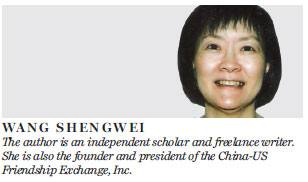Physics Olympiad success is exciting news for all Hong Kong
Updated: 2015-05-21 07:46
By Wang Shengwei(HK Edition)
|
|||||||||
Hong Kong society is not only devoted to business as some may think, although influential tycoons attract the public eye and citizens have strong aspirations for wealth. Hong Kong is, in fact, a society very capable of nurturing talented people for excellence in physics, a discipline upon which much of science depends.
To support this viewpoint, here is some exciting news for all Hong Kong people: This year's students competing as representatives of Hong Kong in the 16th Asian Physics Olympiad (APhO), held at Zhejiang University in Hangzhou from May 3 to May 11, have surpassed the achievements of all previous Hong Kong teams! The team comprised secondary school students trained by the Physics Department of Hong Kong Baptist University (HKBU). Previous teams were trained by Hong Kong University of Science and Technology (HKUST). On their triumphant May 12 homecoming, Secretary for Education Eddie Ng welcomed and congratulated the eight-strong team.
The first APhO was hosted by Indonesia in 2000. The current event drew 186 high school student participants from 25 countries and regions. The competition aims to prepare Asian students for the International Physics Olympiad (IPhO), building networks for further collaborative projects in physics education, and encouraging Asian countries to participate in other international physics competitions.
Hong Kong this time earned three gold, one silver and two bronze medals, as well as two honorable mentions. Thus, all eight team members achieved high distinctions. Michael Wong, HKUST physics professor, noted that Secondary Five student Wong Yat from GT (Ellen Yeung) College produced "the best solution of the problem on fractional quantum Hall effect" and that he was the only competitor among 186 to be awarded full marks for this problem. "These are the best APhO results that Hong Kong has ever got", Michael Wong said.
To put Wong Yat's achievement in perspective, the fractional quantum Hall effect (FQHE) was awarded the Nobel Prize as recently as 1998. It is still an advanced research subject today: According to Wikipedia, "The microscopic origin of the FQHE remains unknown and is a major research topic in condensed matter physics."
Furthermore, the Hong Kong team was placed third among the 25 countries and regions, ex aequo with Chinese Taipei (three gold, one silver and two bronze medals), following top scorer Chinese mainland (eight gold medals) and runner-up Singapore (six gold, one silver and one bronze medals), in terms of gold medals.
Each year over 1000 students from Hong Kong secondary schools compete in the HKPhO. The top 80 students are then trained by a university physics department for about a year to make a team of eight who compete in the APhO; the top five students go on to represent Hong Kong at the IPhO, which takes place this year on July 5-12 in Mumbai (India).
Last year HKBU was selected and funded to run the HKPhO competition and student training for a year, leading to the success seen in the APhO. The training of secondary-school students at HKBU requires around 360 teaching hours per year, equivalent to teaching about 10 three-credit courses. Most of that teaching was done by volunteers at weekends. Ten of HKBU's academic staff and three of their scientific officers contributed in the first year.
This effort was supported by the Hong Kong Academy for Gifted Education, HKUST and the Education Bureau. HKBU was again selected this year to run the next HKPhO competition and training program, leading to the 17th APhO which will be organized at HKUST in 2016.
Hong Kong can be proud of its students' performance, which illustrates the great potential of its well-educated young people. The achievement of our students and their dedicated teachers should be viewed as a beacon of hope and promise for Hong Kong's youth, education, physics and science in today's rapidly changing world. The achievement is particularly noteworthy in the current climate where the most lucrative jobs are mostly related to banking and financial services, whereas physics majors are invariably the Cinderellas of our economy.
Hong Kong must ensure that these star achievers will find not only appropriate higher education opportunities, but also rewarding career paths in the region after graduation.
It is encouraging that, among other efforts, our government has just introduced the new Enterprise Support Scheme (ESS) which provides up to HK$10 million for each approved project on a dollar-for-dollar matching basis for companies to carry out R&D activities. On April 28, when around 700 participants showed up in the Hong Kong Science and Technology Park auditorium to attend an ESS Briefing Session, the atmosphere was filled with eagerness, enthusiasm and confidence.

(HK Edition 05/21/2015 page11)